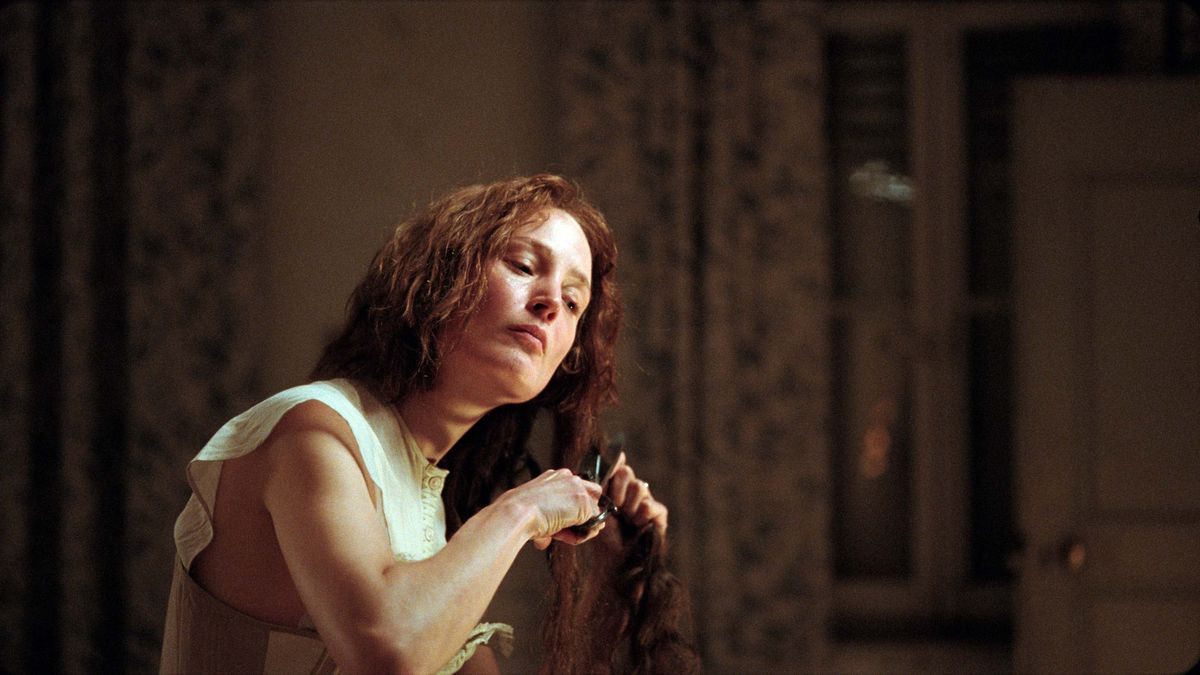When Sofia Coppola followed up her twin successes of Lost in Translation and The Virgin Suicides with her strange anachronistic character study of Marie Antoinette, it left many audiences more than a little crestfallen. One of the most exciting voices in American cinema had, at what might have been the peak of her career, made a film too ponderous to entertain, and too unconvincing to enlighten. Many have since come around on Coppola’s film, finding merit and profundity in her sympathetic portrait of the infamous lady and her gilded cage. Those audiences might well find much to admire about Corsage, Marie Kreutzer’s fictionalized dramatization of eight months in the life of Empress Elisabeth of Austria. However, it’s a much more austere and bitter film than Marie Antoinette, whatever the film’s dryly comic trailer would have you believe. It functions primarily as a portrait of depression and confinement, following the Empress as an unassailable emptiness takes hold of her life.
As the film begins, the Empress is about to pass forty, and throughout the film she is belittled by unasked for comments about her supposedly fading beauty. She lost a daughter very young and is apparently no more than an embarrassment to her remaining children. If her husband the Emperor ever loved her, he clearly no longer does so, and while touring asylums she witnesses the cruel and inhumane treatment of women committed for ailments like grief and adultery. Were she not Empress, she would surely be confined in a strait-jacket too. Perhaps there’s an honesty to that condition she would deem preferable. As it is, she’s left to rage impotently against a world that bores her incessantly and in which she can find no joys whatsoever.
Corsage played at last year’s London Film Festival and in so doing became the second film of that festival (the other being More Than Ever) to showcase Vicky Krieps in a leading role and so demonstrate that no matter how great her talents, she’s not capable of carrying a film on her own. A lead cannot ‘lead’ without somewhere to go and that’s just what Corsage seems to lack. First one way then another, Elisabeth wrestles with her situation, turning her anger in and out, lashing out at her family, her servants, and often herself, taking pleasure in little and indulging in self-destruction as the only available form of rebellion, and in the process, ruining the lives of the subordinate women around her.
We often discuss the concept of the ‘unlikable woman’ on film. Women protagonists are often denied a complexity and moral greyness we freely extend to their masculine counterparts. Perhaps I’m guilty of that, but I confess that I found sympathizing with Elisabeth extremely hard work. She’s oppressed, lonely, and unhappy, and she often finds herself incapable of finding solace, punishing herself and others for her situation.

On one level the film is obviously about gender, certainly. Elisabeth is frequently portrayed in an androgynous manner and is desperately unhappy with the role assigned to her, and the film explores themes of identity with the gentlest of curiosity. It also provides some comment on the nature of biographical drama and the absurd notion of ‘historical accuracy’ (just as Marie Antoinette did with its anachronistic soundtrack and Converse sneakers). However, above the more marketable feminist themes of emancipation and rebellion, Corsage is above all about depression. Elisabeth is depressed, alone, and one by one loses or becomes disillusioned with everything that brought her joy, wearing out the patience of her peers in the process. That is, until the film’s fantasized ending.
Elisabeth’s depression is, of course, not unrelated to the expectations of the patriarchal society around her. The two feed each other. She’s miserable and the indifference and incomprehension of those around her makes her more so. The film often portrays her, somewhat distastefully, as a bit of a romantic enigma. Part of why I feel so resistant to this film and its portrayal of its ‘unlikable’ antihero is that the film persists in finding her selfish behavior charming and its attempts to wring humor our of it fall totally flat. I’m equally unconvinced by the film’s attempts to keep the viewer on side by showing us Elisabeth’s flimsy acts of philanthropy. She shares a cigarette with a baffled soldier maimed in her husband’s war, and we’re supposed to feel as if there’s the slightest shred of altruism in her?
There’s little consistency in Elisabeth’s portrayal. With the film covering so many months, the story becomes very episodic, and combined with her erratic moods, this dispels a coherent continuity of cause and effect and makes the film feel much longer than its 115 minutes. Perhaps a more concise treatment would have allowed the film to feel less baggy and not test the audience’s patience so much. Of course, it’s repetitiveness is the point, to allow us to empathize with her boredom. Personally, I was as bored by her as I was by her life. I thought for a while that I was just struggling to empathize with someone so privileged, but then remembered that Spencer is one of my favorite films in recent memory, so that can’t be the whole story.
I’m increasingly finding my critical faculties disadvantaged by my growing jaded and having seen too many films. Too often I find myself coming out of a film feeling as if I might have been enamored with it had I not already seen a film do much the same thing. In this case, I can’t shake the impression that Corsage is just a much drier Marie Antoinette. However, that film was already too dull for my liking so I think it would be generous of me to assume I’d feel much more charitably towards Corsage under any circumstances. It also put me in mind of another Kirsten Dunst vehicle: Melancholia, a film that contains the most accurate and relatable depiction of depression I’ve ever seen, and which I hated every moment of. Corsage has a very similar character, a studiously observed portrayal of an excruciatingly dull existence.
On an intellectual level, I understand the ideological aspirations of Corsage, I even sympathize with them, but I was also more bored watching it than I have been in months. There are moments of esoteric beauty and deep sadness to it and I can easily see how others could be utterly beguiled by it. I wish I felt similarly. It’s one of the most frustrating sorts of movies: full of scenes that are end to end well acted, gorgeous to behold, and resistant to easy, surface level interpretations, but which become utterly uninteresting when put end to end, and all you’re left mulling over is their fabrication and contrivance.



